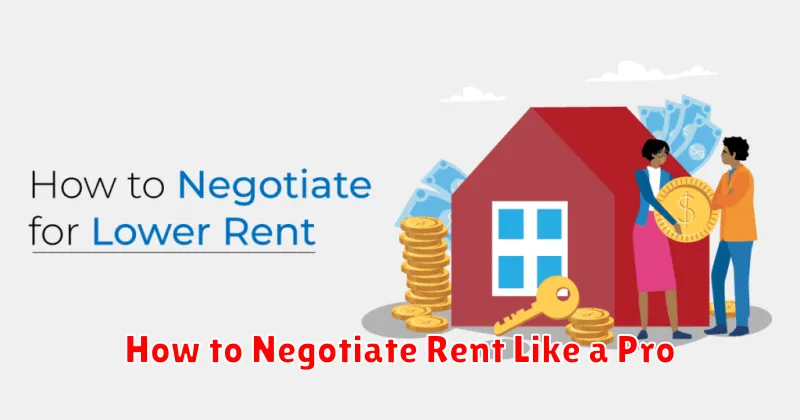Are you tired of escalating rental costs eating into your budget? Do you feel like you’re paying too much but aren’t sure how to approach your landlord about a rent negotiation? Learning how to negotiate rent effectively can save you significant money over the course of your lease, putting more money back in your pocket. This article will empower you with the tools and strategies necessary to negotiate rent like a pro, regardless of your current living situation. We’ll cover essential tips for rent negotiations, from preparation and research to communication tactics and securing a mutually beneficial agreement.
Negotiating rent doesn’t have to be a daunting task. Whether you’re signing a new lease or looking to renew your current agreement, understanding the market and approaching the conversation strategically can greatly increase your chances of success. By mastering the art of rent negotiation, you can secure a more affordable living arrangement and gain valuable peace of mind. In the following sections, we will delve into proven methods to lower your rent, empowering you to negotiate rent like a pro and achieve your desired outcome.
Know the Market Rate
Before entering any rent negotiation, research the current market rate for similar properties in your area. Understanding how much other landlords are charging for comparable units gives you a strong foundation for your argument.
Factors influencing market rate include:
- Location
- Size (square footage)
- Amenities (parking, laundry, etc.)
- Age and condition of the property
Use online resources and check local listings to gather this data. Knowing the market rate empowers you to negotiate confidently and realistically.
Highlight Your Renter Qualities
When negotiating rent, presenting yourself as a desirable tenant is crucial. Landlords seek reliability and responsibility. Emphasize qualities that minimize risk for them.
Strong credit history demonstrates financial stability. Offer to provide a credit report. A stable employment history further assures your ability to pay rent consistently. Mentioning a consistent income stream helps solidify this point.
If you have a history of being a responsible renter, provide references from previous landlords. Highlighting positive feedback can be beneficial. Offer to sign a longer lease term if you seek a lower monthly rate. This provides the landlord with guaranteed income for an extended period.
Offer to Sign Longer Lease
A longer lease term can be attractive to landlords as it provides stability and reduces turnover costs. Offering to sign a longer lease, such as two years instead of one, can provide leverage for negotiating a lower monthly rent.
Landlords may be willing to decrease the monthly rent in exchange for the guaranteed income stream a longer lease provides. Be prepared to commit to the longer term, as breaking a lease can have significant financial repercussions.
Consider your personal circumstances and housing needs before making this offer. If you’re unsure about your future plans, a shorter lease might be a more suitable option, even if it means a slightly higher monthly rent.
Mention Competing Listings
Research similar properties in the area and be prepared to discuss their rental rates. Knowing what other landlords are charging gives you leverage. If you find comparable listings with lower rents or better amenities, politely mention them to your current or prospective landlord.
Do not be confrontational. Simply state that you’ve noticed other similar units available for less and inquire if there’s any flexibility in the listed price. This demonstrates you’ve done your homework and are serious about finding the best value.
Ask for Perks Instead of Discounts
Sometimes, landlords are more willing to offer perks than reduce the stated rent price. This can be a valuable negotiation tactic, especially in competitive rental markets.
Consider asking for things like a free month of rent, a covered parking spot, waived amenity fees, or an upgrade to a better unit with similar rent. These perks can provide significant value without requiring the landlord to lower the advertised rental rate.
Before your negotiation, brainstorm a list of desirable perks. Prioritize those that provide true value to you. This allows for flexibility during the negotiation process.
Time Your Negotiation Right
Timing plays a crucial role in rent negotiation success. Understanding the rental market dynamics and your landlord’s position can significantly impact your leverage.
Negotiating during the off-season (typically fall and winter) often yields better results. Demand is lower, giving landlords more incentive to retain tenants. Conversely, peak season (spring and summer) makes it harder to secure concessions.
Consider your landlord’s current situation. A high vacancy rate might make them more open to negotiation, whereas a fully occupied property diminishes your bargaining power.
Be Professional and Polite

Approaching rent negotiation with professionalism and politeness is crucial. Landlords are more receptive to tenants who present themselves respectfully. Maintain a calm and courteous demeanor throughout the process, even when discussing disagreements.
Clearly and concisely communicate your desired outcome, supporting your request with factual data and market research. Avoid emotional pleas or aggressive tactics. Being respectful increases the likelihood of reaching a mutually beneficial agreement.
Put It in Writing
A verbal agreement is good, but a written agreement offers greater protection. Once you and your landlord reach an agreement, put the terms in writing. This protects both parties and clarifies the details of the agreement, preventing future misunderstandings.
This written agreement should include the new rent amount, the duration of the lease at the new rate, and any other agreed-upon modifications to the original lease. Make sure both you and the landlord sign and date the agreement. Keep a copy for your records.
Be Ready to Walk Away
One of the most powerful tools in negotiation is the ability to walk away. If you’re not willing to walk away from a deal, you’re at a disadvantage.
Before you begin negotiating, determine your walk-away price. This is the maximum amount you’re willing to pay. If the landlord won’t budge below this figure, be prepared to leave and look for other options.
Having other options lined up strengthens your position. Knowing you have alternatives gives you the confidence to stand firm on your walk-away price. This doesn’t mean being rude or dismissive; it simply means being prepared to politely decline if the terms aren’t acceptable.
Follow Up After the Meeting

After your meeting, promptly send a follow-up email to the landlord or property manager. This reiterates your interest and summarizes the key points discussed.
Confirm any agreements reached, such as the agreed-upon rent price or any concessions. If any points remain unresolved, restate your position clearly and politely.
This demonstrates professionalism and helps ensure everyone is on the same page, preventing misunderstandings and facilitating a smooth transition into your new lease agreement.

